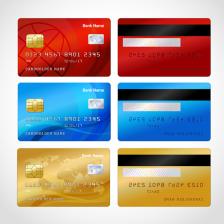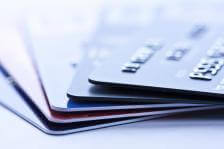8 Credit Card FAQs and Tips to Build Credit
Money Girl answers 8 frequently asked questions about credit cards and gives tips to maintain and build credit.

But credit can be complicated and is often misunderstood, even by savvy people. In this episode, I’ll help you stay out of trouble by answering 8 frequently asked questions about credit cards, and give you tips to maintain and build credit.
Sponsor: Thanks to Audible for supporting our channel. Get a free audiobook of your choice at audiblepodcast moneygirl.
Click here to sign up for the Money Girl Newsletter for more money tips—it’s FREE!
Why You Should Build Good Credit
The credit accounts you use, such as credit cards, loans, and lines of credit, lay the foundation for your credit scores. You must have active credit accounts in your name and use them responsibly over time to show that you’re trustworthy and ultimately build credit.
But even if you don’t plan on making any big purchases, most people don’t understand the role credit plays in addition to borrowing money. Not only does having good credit qualify you for low, money-saving interest rates, good credit also gives you:
- lower auto insurance premiums (in most states)
- lower home insurance premiums (in most states)
- lower security deposits on utilities
- more rental housing opportunities
- better chances to get a job
Free Resource: Request an invitation to join Dominate Your Debt – Laura’s private Facebook Group
8 Credit Card FAQs and Tips to Build Credit

Credit Card Question #1: Tonya asks, “I’m a new graduate and want to get my first credit card—but apparently I don’t have a credit score. How is it possible to get a credit card with no credit?”
Answer: In order to have a credit score you must have a credit history of at least 3 to 6 months. While it might seem like a catch-22 to need credit before you can be approved for credit, there’s an easy solution.
No matter if you’re just starting to build credit from scratch or are rebuilding it, you can always get a secured credit card. They look just like regular, unsecured credit cards, are accepted in all the same places, and give you many of the same benefits.
The main difference between a secured and a regular credit card is that you must make an upfront, refundable deposit to open the account. You choose the amount, which could range from $200 to $3,000, and it becomes your available credit limit.
When choosing a secured credit card, make sure that it reports your payment information to the national credit agencies because that’s the only way to build credit. Check out these great card options:
- Open Sky Secured Visa
- First Progress Secured MasterCard
- CreditCards.com Secured Cards
- USAA Secured Card
Credit Card Question #2: Bill asks, “I’m trying to improve my credit so I can buy a house in a few years. I recently got 2 credit cards, even though I don’t really need them. Both say they will increase my credit limit in 6 months as long as I make minimum payments. Is it better for my credit to pay the minimum or the full balance every month?”
Answer: Making timely payments on credit accounts is one of the most important factors for your credit scores. As long as your minimum payment is received by the statement due date, you can build great credit.
However, it’s never a good idea to carry a balance on a credit card from month to month. The interest can cause you to end up paying 2 to 3 times more for items charged on a card. Additionally, you want to keep your credit utilization below a certain threshold, which I’ll cover in a moment.
So I recommend that you only make card charges that you can pay off in full every month. Sending in the full balance allows you to build great credit without paying interest.
See also: The Credit Score Survival Kit—a free ebook and video tutorial with strategies to build credit fast!

Answer: Once you’ve used a secured credit card to build your credit, it’s time to apply for a regular credit card. Some secured accounts may give you the option to convert to a regular, unsecured credit card after a period of time.
If you can’t get a regular, no-fee card from your current card company, I recommend that you apply for a new one. I’d wait and cancel your secured card after you get a regular one to replace it.
Credit Card Question #4: Frank asks, “My ultimate goal is to become a homeowner. Right now, I’m an authorized user on someone else’s credit card. Would having another card in my name help me build credit?”
Answer: Being an authorized user on someone else’s credit card means that you have permission to use it, but aren’t responsible for any of the debt. It’s a great first step in establishing credit, but only if the account history is reported on your credit report and the card owner makes payments on time.
As I’ve mentioned, you must have a history of positive information in your credit reports to build credit. So, I recommend that you get an additional credit card in your own name as soon as possible. If your credit isn’t good enough to qualify for a regular card, apply for one of the secured credit cards that I recommend in this article.
Free Resource: Request an invitation to join Dominate Your Debt – Laura’s private Facebook Group
Credit Card Question #5: Steve asks, “How can I find out if a particular secured credit card will report my payment information to the credit bureaus?”
Answer: Any secured credit card that reports your payment information to the nationwide credit agencies should advertise that benefit upfront, since it’s a competitive advantage. If you don’t see their reporting policy, you could contact the card company to find out before you apply.
Once you open a secured credit card account and begin making monthly payments, you should see it listed on your credit reports if the company is reporting your information.
You can pull each of your credit reports for free, once a year, from each of the 3 nationwide credit reporting agencies (Equifax, Experian, and TransUnion) at annualcreditreport.com. Your report doesn’t include your credit scores; however, you can get your credit scores for free.
Two to 3 cards should be sufficient for most people; but you can have many more and still have excellent credit as long as you manage them well.
Credit Card Question #6: Catherine asks, “How many credit cards should I have to build the best credit?”
Answer: There isn’t an exact number of credit cards you need to build excellent credit. How many cards you should have depends on your situation and how you use them.
I mentioned that making payments on time is generally the most important factor for your credit scores. The next, most powerful factor is credit utilization, or the amount of credit you use compared to your credit limits.
For example, if you owe $500 on a card with a $1,000 credit limit, your utilization, or balance-to-limit ratio, is 50%. For optimal credit, you should never exceed 20% to 30% of your card’s credit limit.
To achieve this, you may need to spread out your balances on more than one credit card so you have more total credit to work with. Two to 3 cards should be sufficient for most people; but you can have many more and still have excellent credit as long as you manage them well.
Consider having a low-rate card for times when you must carry a balance and a higher-rate rewards card for charges that you always pay off each month. No annual fee cards are best, but some rewards cards may charge a fee. It may be worth it, depending on the benefits you’ll get from the card.
Credit Card Question #7: Kelli asks, “I recently paid off 3 credit cards and then closed one of them. I was going to close the remaining 2 but heard that it would hurt my credit. What should I do?”
Answer: It’s true that closing or cancelling a credit card account—even one that you don’t use anymore—can hurt your credit. That’s because it causes your total amount of available credit to shrink, which causes your utilization ratio to increase, and your scores to decrease.
In other words, closing a credit card account means that your total balances become a higher percentage of your total credit limits, which makes you look riskier to creditors, even if you really aren’t.
If you’re planning on making a big purchase in the next 3 to 6 months, such as a home or car, I don’t recommend closing any credit accounts. But if not, and you really want to get rid of additional credit cards, space out cancellations over time.
Another factor that’s used to calculate your credit scores is the length of time that you’ve had credit accounts. So, I don’t recommend closing a card that you’ve had for more than 5 years. You might just use it to make a small purchase from time to time that you pay off in full, just to keep it active.
See also: 9 Things That Can’t Hurt Your Credit Scores
Credit Card Question #8: Sundarapandian asks, “I want to buy airline tickets for $4,500, but my credit card only has a credit limit of $5,000. So the charge would exceed 30% of my available credit limit. If I pay if off right away, would it still hurt my credit?”
Answer: Paying off a big credit card charge quickly can help you avoid a high utilization ratio and protect your credit. The amount used in the calculation is generally your previous month’s statement balance.
The idea is that if you pay off the balance before the statement’s monthly closing date, it couldn’t be reported to the credit agencies. So, I definitely recommend that you pay off a big credit card purchase as soon as possible, instead of waiting until the statement due date.
Also, when a card offers you a higher credit limit, always take it. Having more available credit relative to your balances will cut your utilization ratio and raise your credit.
Get More Money Girl!

To connect on social media, you’ll find Money Girl on Facebook, Twitter, and Google+. Also, if you’re not already subscribed to the Money Girl podcast on iTunes or on the Stitcher app, both are free and make sure that you’ll get each new, weekly episode as soon as it’s published on the web.
Click here to subscribe to the weekly Money Girl audio podcast—it’s FREE!
There’s a huge archive of past articles and podcasts if you type in what you want to learn about in the search bar at the top of the page. Here are all of the many places you can connect with me, learn more about personal finance, and ask your money question:
- Money Girl on Facebook
- Laura on Facebook
- Google+
- Money Girl podcast on iTunes (it’s free to subscribe!)
- Money Girl on the FREE Stitcher app
- Email: money@quickanddirtytips.comcreate new email
Click here to sign up for the free Money Girl Newsletter!
Download FREE chapters of Money Girl’s Smart Moves to Grow Rich
To learn about how to get out of debt, save money, and build wealth, get a copy of my award-winning book Money Girl’s Smart Moves to Grow Rich. It tells you what you need to know about money without bogging you down with what you don’t. It’s available at your favorite bookstore as a paperback or e-book. Click here to download 2 FREE book chapters now!
Shopping Time, Credit Cards, and Credit Cards Closeup images courtesy of Shutterstock.






